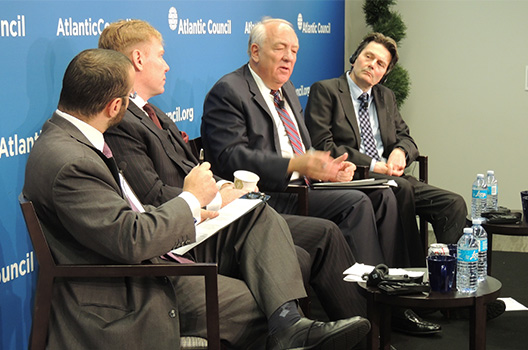On November 19, 2015 the Atlantic Council’s Rafik Hariri Center for the Middle East in cooperation with the Friedrich Ebert Foundation (FES) and the Commission for International Justice and Accountability (CIJA) hosted a discussion on the conflict between accountability for war crimes and negotiating a peaceful resolution to the war in Syria. Former US Ambassador at-Large-for War Crimes Issues Ambassador Stephen Rapp, Commission for International Justice and Accountability Director Dr. William Wiley, and German Parliamentarian Dr. Rolf Mützenich joined the Atlantic Council to discuss this timely issue. Rafik Hariri Center Fellow Mr. Faysal Itani moderated the discussion.

Dr. Wiley explained that CIJA is a nonprofit organization that builds cases regarding war crimes and crimes against humanity up to a criminal law standard for the conflict in Syria. To do this, his teams in the field have collected 600,000 to 700,000 pages of documentation generated by Syrian regime elements, security, intelligence, and military forces. Wiley pointed out that what is unique in this situation is that the current president of the Syrian regime is among the suspects.
Ambassador Rapp discussed how in some conflicts, it is difficult to get individuals to negotiate when they are implicated in war crimes and crimes against humanity. In that regard, oftentimes international powers have an instinct to push justice aside in order to progress with negotiations. However, Rapp asserted that pushing justice aside is not possible in Syria given the extent of violations. Similarly, Rapp explained that granting amnesty in exchange for peace is a violation of international law in and of itself.
Dr. Mützenich explained that even while being directly affected by the flow of refugees, many in Germany believe peace can only be possible if there is justice. Mützenich explained that Germany participated in the development of the international criminal code. Therefore, while his government is very interested in the success of the negotiations, many believe the international community must not forgo the necessity of seeking justice.
Below is the webcast from the event:
